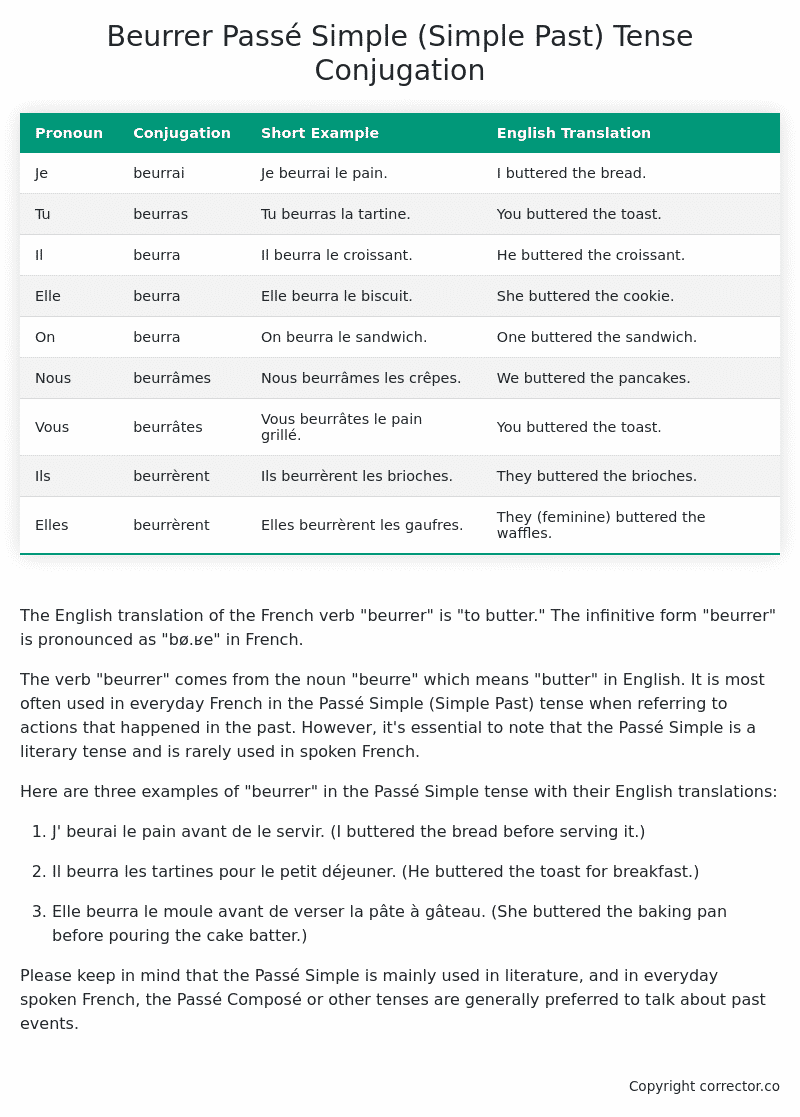Passé Simple (Simple Past) Tense Conjugation of the French Verb beurrer
Introduction to the verb beurrer
The English translation of the French verb “beurrer” is “to butter.” The infinitive form “beurrer” is pronounced as “bø.ʁe” in French.
The verb “beurrer” comes from the noun “beurre” which means “butter” in English. It is most often used in everyday French in the Passé Simple (Simple Past) tense when referring to actions that happened in the past. However, it’s essential to note that the Passé Simple is a literary tense and is rarely used in spoken French.
Here are three examples of “beurrer” in the Passé Simple tense with their English translations:
-
J’ beurai le pain avant de le servir.
(I buttered the bread before serving it.) -
Il beurra les tartines pour le petit déjeuner.
(He buttered the toast for breakfast.) -
Elle beurra le moule avant de verser la pâte à gâteau.
(She buttered the baking pan before pouring the cake batter.)
Please keep in mind that the Passé Simple is mainly used in literature, and in everyday spoken French, the Passé Composé or other tenses are generally preferred to talk about past events.
Table of the Passé Simple (Simple Past) Tense Conjugation of beurrer
| Pronoun | Conjugation | Short Example | English Translation |
|---|---|---|---|
| Je | beurrai | Je beurrai le pain. | I buttered the bread. |
| Tu | beurras | Tu beurras la tartine. | You buttered the toast. |
| Il | beurra | Il beurra le croissant. | He buttered the croissant. |
| Elle | beurra | Elle beurra le biscuit. | She buttered the cookie. |
| On | beurra | On beurra le sandwich. | One buttered the sandwich. |
| Nous | beurrâmes | Nous beurrâmes les crêpes. | We buttered the pancakes. |
| Vous | beurrâtes | Vous beurrâtes le pain grillé. | You buttered the toast. |
| Ils | beurrèrent | Ils beurrèrent les brioches. | They buttered the brioches. |
| Elles | beurrèrent | Elles beurrèrent les gaufres. | They (feminine) buttered the waffles. |
Other Conjugations for Beurrer.
Le Present (Present Tense) Conjugation of the French Verb beurrer
Imparfait (Imperfect) Tense Conjugation of the French Verb beurrer
Passé Simple (Simple Past) Tense Conjugation of the French Verb beurrer (You’re reading it right now!)
Passé Composé (Present Perfect) Tense Conjugation of the French Verb beurrer
Futur Simple (Simple Future) Tense Conjugation of the French Verb beurrer
Futur Proche (Near Future) Tense Conjugation of the French Verb beurrer
Plus-que-parfait (Pluperfect) Tense Conjugation of the French Verb beurrer
Passé Antérieur (Past Anterior) Tense Conjugation of the French Verb beurrer
Futur Antérieur (Future Anterior) Tense Conjugation of the French Verb beurrer
Subjonctif Présent (Subjunctive Present) Tense Conjugation of the French Verb beurrer
Subjonctif Passé (Subjunctive Past) Tense Conjugation of the French Verb beurrer
Subjonctif Imparfait (Subjunctive Imperfect) Tense Conjugation of the French Verb beurrer
Subjonctif Plus-que-parfait (Subjunctive Pluperfect) Tense Conjugation of the French Verb beurrer
Conditionnel Présent (Conditional Present) Tense Conjugation of the French Verb beurrer
Conditionnel Passé (Conditional Past) Tense Conjugation of the French Verb beurrer
Conditionnel Passé II (Conditional Past II) Tense Conjugation of the French Verb beurrer
L’impératif Présent (Imperative Present) Tense Conjugation of the French Verb beurrer
L’impératif Passé (Imperative Past) Tense Conjugation of the French Verb beurrer
L’infinitif Présent (Infinitive Present) Tense Conjugation of the French Verb beurrer
L’infinitif Passé (Infinitive Past) Tense Conjugation of the French Verb beurrer
Le Participe Présent (Present Participle) Tense Conjugation of the French Verb beurrer
Le Participe Passé (Past Participle) Tense Conjugation of the French Verb beurrer
Struggling with French verbs or the language in general? Why not use our free French Grammar Checker – no registration required!
Get a FREE Download Study Sheet of this Conjugation 🔥
Simply right click the image below, click “save image” and get your free reference for the beurrer Passé Simple tense conjugation!

Beurrer – About the French Passé Simple (Simple Past) Tense
Formation
Usage
Narration
Historical Context
Interactions with other tenses
Passé Composé
Imparfait
Conditional and Subjunctive
Summary
I hope you enjoyed this article on the verb beurrer. Still in a learning mood? Check out another TOTALLY random French verb conjugation!


